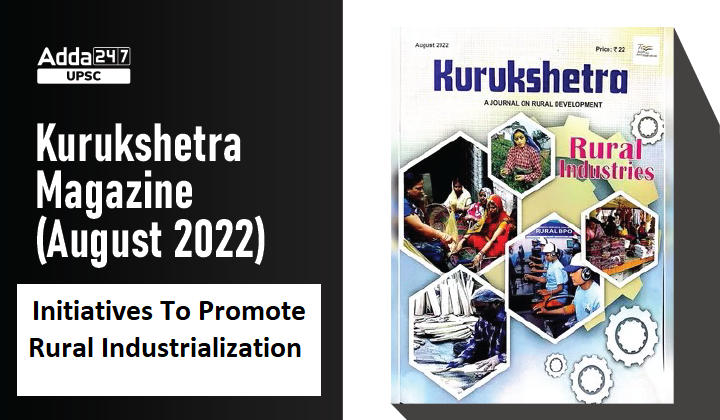Table of Contents
Kurukshetra is a Monthly Magazine which is issued by the Publications Division of the GOI.
Kurukshetra Magazine is one of the most important and indispensable source for UPSC Civil Services Exam Preparation. Keeping this in mind, here, we come with ”Analysis Of Kurukshetra Magazine” on daily basis, which covers the monthly Kurukshetra Magazine in easy and smooth pointed form, keeping in mind the demand of UPSC aspirants.
Introduction
- The contribution of agriculture to India’s GDP has declined over the decades and has been substantially replaced by the manufacturing and service sectors.
- However, the agriculture sector’s share in job creation has not fallen as much as the fall in its share in GDP.
- In 2019, the share of the services sector in job creation was 32% against its contribution to the GDP standing at 54%. On the other hand, the share of the manufacturing and agriculture sectors in job creation was 26% (share in GDP: 17%) and 42% (share in GDP: 16%), respectively. From these figures, it is clear that even though the services sector has the maximum share in the GDP of the country, its share in job creation is low.
- Even though the service sector contributes to over 55% of India’s GDP, its capacity to provide employment opportunities is limited. The thrust, therefore, lies on the manufacturing sector to absorb the surplus labour force from the agricultural sector.
Production-Linked Incentive Scheme (PLI)
- This scheme provides incentives to companies for enhancing their domestic manufacturing and focus on reducing import bills and improve the cost competitiveness of local goods.
- The PLI scheme offers incentives on incremental sales of products manufactured in India.
Scheme of Funds for Regeneration of Traditional Industries (SFURTI)
- Launched by the Ministry of MSME in 2005.
- It aims at ensuring that the various traditional clusters of industries like bamboo, honey, Khadi spread throughout the country, especially in rural India.
Scheme for Promotion of Innovation, Rural Industries and Entrepreneurship (ASPIRE)
A Scheme for Promotion of Innovation, Rural Industries and Entrepreneurship (ASPIRE) Initiative to set up incubation centres and a network of technology centres for enhancing entrepreneurship across India.
Prime Minister’s Employment Generation Programme (PMEGP)
- Credit-linked subsidy scheme launched by merging two schemes namely Prime Minister’s Rozgar Yojana and Rural Employment Generation Programme.
Pradhan Mantri MUDRA Yojana
- Micro Units Development and Refinance Agency Ltd (MUDRA) provides refinance support to Banks for lending to micro units having loan requirements of up to Rs.10 lakh.
- Launched in 2015, it provides its services to small rural and semi-urban entrepreneurs outside the service area of regular banks
- As of March 2022, the number of loans sanctioned under the Pradhan Mantri MUDRA Yojana (PMMY) was 48.92 million and the amount disbursed was Rs. 3,02,948.49 crore.
Credit Guarantee Scheme for Micro and Small Enterprises (CGTMSE)
- Facilitates credit to MSME units through collateral-free credit facility extended by eligible lending institutions to new and existing micro and small enterprises.
- The Ministry of MSME and Small Industries Development Bank of India (SIDBI) have jointly established a Trust named Credit Guarantee Fund Trust for Micro and Small Enterprises in order to implement Credit Guarantee Scheme for MSMEs.
- The corpus of CGTMSE is contributed by the Union Government and SIDBI.
Sub Mission on Agricultural Mechanization (SMAM)
- It is being implemented w.e.f April,2014.
- The scheme aims at ‘reaching the un-reached’ by bringing to the small and marginal farmers in the core and giving the benefits of farm mechanization, by Promoting ‘Custom Hiring Centers’ , creating hubs for hi-tech & high value farm equipment, distribution of various agricultural equipment, creating awareness among stakeholders through demonstration and capacity building activities, and ensuring performance- testing and certification at designated testing centers located all over the country.
National Agriculture Market (e-NAM)
- Government of India has launched National Agriculture Market (e-NAM) Scheme on 14th April, 2016 with the objective of creating online transparent competitive bidding system to facilitate farmers with remunerative prices for their produce.
- So far, 1000 mandis of 18 States and 3 UTs have been integrated with e-NAM platform.
Agricultural Marketing Infrastructure (AMI)
- In order to promote scientific storage facilities in rural areas of the country, the Government is already implementing Agricultural Marketing Infrastructure (AMI) which is a sub-scheme under the Integrated Scheme for Agricultural Marketing (ISAM).
- AMI scheme is a demand driven with back ended credit linked subsidy scheme in which rate of subsidy provided is @ 25% and 33.33% based on the category of eligible beneficiary. Assistance under the sub-scheme is available to Individual, Group of farmers/growers, Registered Farmer Produce Organizations (FPOs) etc.
Mission for Integrated Development of Horticulture (MIDH)
- Under this financial assistance for setting up of Post-Harvest Management Infrastructure including cold storage, cold room facilities for horticultural produce @ 35% of the project cost in general areas and 50% in case of hilly and scheduled areas per beneficiary is available.
- The component is demand/ entrepreneur driven through commercial ventures for which Government assistance is credit linked and back ended.



 TSPSC Group 1 Question Paper 2024, Downl...
TSPSC Group 1 Question Paper 2024, Downl...
 TSPSC Group 1 Answer key 2024 Out, Downl...
TSPSC Group 1 Answer key 2024 Out, Downl...
 UPSC Prelims 2024 Question Paper, Downlo...
UPSC Prelims 2024 Question Paper, Downlo...




